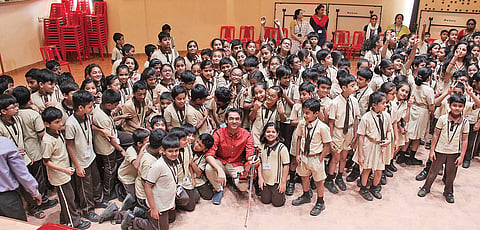

Violin maestro and legendary musician L Subramaniam and playback singer wife Kavita Krishnamurthy have passed the baton to their children, Ambi and Bindu Subramaniam to make classical music more accessible. Since consumption of popular music has exponentially gone up through social media, the two siblings are determined to de-elitise music by exposing it to students in government schools.
Get them young is the motto: the two young musicians have taken their parents’ brainchild, SaPa (Subramaniam Academy of Performing Arts) to the next level—the SaPa in Schools programme. “We aim to bring the study of music within reach of every child, even poor and underserved children,” says singer-songwriter Bindu.
The SaPa methodology developed by Subramaniam is the bedrock for the curriculum, with the aim of creating the next generation of musicians. “Music is not just about singing or hitting the right notes on an instrument. It is a transformational tool which we are tapping to create a better world enriched by multiple cultures,” Bindu says.
SaPa was started in 2007 by Subramaniam and Krishnamurthy to teach Indian and western classical music to children in a nondescript building located in a modest nook of Bengaluru. The ambitious idea behind SaPa and the SaPa in Schools programme is making the world a better place with music. Brother and sister are convinced that this can be achieved by integrating music as a subject in school curriculums. “Music is among the greatest stress-busters. There is empirical evidence showing that it sharpens brain activity, improves cognitive skills and boosts self-worth,” explains Ambi who is a well-known violinist and music composer.
In 2011, Bindu and Ambi virtually stepped into the shoes of their parents and took charge as the Dean and Associate Dean respectively of SaPa. Growing up in a family with an illustrious musical lineage, the siblings were unsurprisingly hailed as child prodigies. Growing up, they carved their space on the global music scene with unique compositions that fuse classical Indian and contemporary world music. However, they felt that it was time to “give back”.
In 2014, the two of them launched ‘SaPa in Schools’, treating music as an integrated syllabus like Maths, Science or English. Today, the programme has reached 70 schools spread across South India and educates over 30,000 children. Though the baseline for study remains Indian classical music, the children are given exposure to other genres and music from around the globe.
Three-year-olds and above are enlisted in the programme. “We make learning a fun experience so that the students remain interested and eventually fall in love with music. They are allowed to meddle with, and sometimes even take apart musical instruments. The lesson is first about touch, then strumming and voila! Four-year-olds are creating their own melodies and compositions,” says Bindu, explaining how The SaPa Baby book deconstructs learning. Ambi recommends the manual to adults who are first-time learners of music.
The big breakthrough for the music academy and its educational programme came in 2017 after they approached government schools to include their projects in the curriculum. Today, SaPa covers 15 government schools in South India and teaches 8,000 poor and underprivileged children. Music education is free of cost for them. They also get help from the Subramaniam Foundation and Bengaluru-based Akshaya Patra Foundation.
‘SaPa in Schools’ has 50 full-time teachers—some professional musicians, others who are passionate amateurs; but are all trained to use the SaPa module. “Among them are several engineers, chartered accountants and other professionals who decided to change their career and train with us to become professional music teachers,” says Bindu. The two young music activists feel only music makes the world go around. They believe that the future will call the tune at the behest of children who overcome their backgrounds and live the melody.
MUSICAL OFFERS